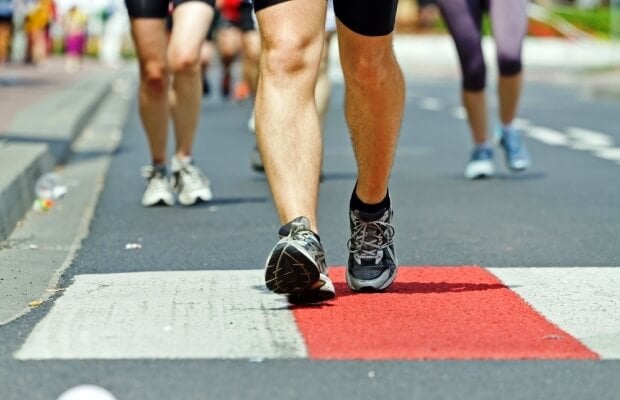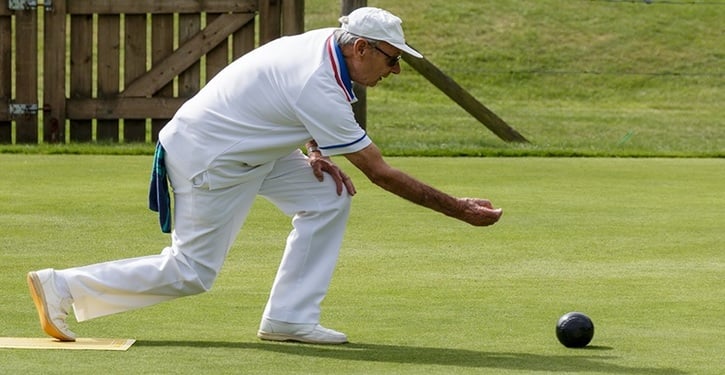Walking sports, as the gentler version of popular sports like football and hockey, get our hearts pumping and muscles working. Alongside many physical health benefits, they boost mental wellbeing too.
Endorphins or ‘happy hormones’ flow as we move, improving our mood. The love of the sport lifts our spirits. With our game faces on and goals in mind, concentration is key. We need to keep a constant eye on the ball and, when it lands in our hands or at our feet, agility is needed — mentally, as well as physically. ‘Who should I pass to?’ ‘Where are my opponents?’ ‘How far is the goal?’ are thoughts that whizz through our brains. Walking sports help to keep the mind sharp.
While we’re taking steps to get active at home (and our ambassador, John Inverdale, has shared fantastic tips), keeping our minds healthy is vital too. So, when the time is right to resume walking sports and we’re slipping our trainers back on to head into the game, we feel alert and excited.
The good news is, there are fun opportunities to enjoy at home that offer mental stimulation. Here are our five recommendations that may enhance your ability once back on the pitch. From baking — so you can whip up tasty treats for your walking sports family to enjoy post-game — to painting, to hone your motor skills and hand-eye co-ordination in play.
Baking
In walking sports, the camaraderie and community spirit doesn’t stop when the whistle blows. The post-game cuppa and cake is just as important! The act of baking or buying and bringing refreshments is just as fulfilling as tucking in, so why not take this time out to practise whipping up tasty treats?
If you fancy yourself a budding Prue Leith or Paul Hollywood, or perhaps haven’t touched a wooden spoon since Home Economics, pop on an apron, dust off your rolling pin and try baking.
From melting, mixing, kneading and proving to filling the home with a fabulous aroma of freshly baked goods and, finally, the all-important taste test, baking is a multi-sensory experience. Better yet, it boasts mood-boosting qualities too; a recent study found that those of us who enjoy baking and cooking on a regular basis feel more relaxed. In fact, one in three Brits turn to baking to de-stress. ‘Happiness’ is the predominant emotion evoked in keen bakers, followed by ‘calm’ and ‘focus’.
As baker Peter Reinhart once said: “It’s all about a balancing act between time, temperature and ingredients. That’s the art of baking.” From carefully following instructions, to weighing the ingredients and ensuring your timings are spot on, baking requires precision and patience. These skills are especially important given that ageing can lead to decreased activity in parts of the brain that enable concentration. We all know the precision that’s needed to pass to your team-mate or aim for the goal. We might not see immediate wins but, with patience and focus, we’re far more likely to achieve!
Baking allows your creativity to shine. Dreaming up new recipes and experimenting with different flavours and textures is great fun. You’ll soon be raising smiles with your shortbread and wowing with your Viennese Whirls! Indeed, over half (55%) of home bakers relish the feeling of achievement after baking.1 It’s a delightful activity with a delicious result.
Sweet treats aside, you could even practise cooking nutritious snacks and meals to fuel your body and aid recovery when it’s time to get back in the game. From vitamin-packed fresh salads to grilled chicken with roasted Mediterranean-inspired veggies, take this time to find foods you enjoy, with the knowledge that they’re kind to your body too.
Online Courses
If you’re a walking sportster, you’ve already shown proactivity and an eagerness to learn new skills. There are endless opportunities to broaden your knowledge and grow your skillset further with online courses. Enjoy fun tutorials on activities like cake decorating to impress your team-mates at the next post-game social. Maybe you’ve always fancied doing photography? You could soon become your club’s resident photographer, whether it’s capturing the celebrations after an epic goal or your team-mates’ smiling faces enjoying cake afterwards. Alternatively, you could learn a lifelong skill like first aid.
Embarking on an online course can create a sense of routine; logging in on time, listening closely and practising for ‘homework’ requires self-discipline. Recalling previous classes will also sharpen your memory, with mental exercises like this proven to reduce the risk of developing dementia. Sound familiar? It’s very similar to getting to grips with walking sports. Partaking in a new hobby will be equally motivating and fulfilling. It’s a productive way to spend your time — it’s day-to-day enjoyment that will result in longer-term skills.
As walking sportsters, we also know the importance of community. Online courses may involve video calls or forums so you can interact with others. Just like with walking sports, you already have the springboard of shared interests to start a lovely friendship. Our social health and mental wellbeing are closely connected, so take time to get to know your virtual team!
To find an online course for you, simply enter an activity or skill you’d like to learn into Google to see what’s available. Otherwise, websites like Reed list options for inspiration. You’ll add another string to your bow and hone transferable skills for walking sports when play resumes.
Painting
You might fancy yourself more a ‘player’ than a Picasso, but the good news is that anyone can be an artist. Just let your creative juices flow. You could paint a vase of flowers, the view from your window or a photo of your walking sports team. Alternatively, create a bright abstract piece. This is about self-expression and you may find the process very therapeutic. If the artwork doesn’t turn out as you hoped, improvising is a fantastic way to nurture your problem-solving skills.
Art very therapeutic. By tapping into your creativity, you can relieve mental strain. Focus on the object, view or memory and let your hand do the talking. This will test your hand-eye co-ordination, therefore improving your motor skills, which will be useful when you’re playing walking sports again. Painting requires a sustained level of focus, keeping your mind stimulated.
Once your artwork is complete, you’ll feel a sense of pride and may wish to show it off on a video call with your (no doubt impressed) fellow walking sportsters, or bring it along to your next session. If you’re looking for inspiration or direction from an expert, there are many online courses available.
Puzzles
Filling in a crossword or sudoku in the paper may seem like a relaxing afternoon task, but it’s called a ‘brainteaser’ for a reason!
Word games sharpen the mind; for example, sudokus test logic while a crossword requires longer-term memory recall. You’ll also learn fun facts as you go to test your team-mates with. Virtual versions of your favourite games are only a click away; simply Google to play on the computer or download an app onto your mobile phone or tablet. Otherwise, there are always classics like chess or bridge. You may also find a wonderful online community as most games offer multi-player options. Why not suggest a friend or two signs up and challenge them? It’s a fun way to channel your competitive spirit before walking sport sessions resume.
Another popular, nostalgic activity is a jigsaw puzzle. These aren’t the reserve of childhood — there are many options available to buy online of varying levels of difficulty that can form beautiful pictures. Jigsaw puzzles exercise both the left and right-hand sides of the brain at once. The ‘left’ brain is logical, working in linear fashion, while the ‘right’ brain is creative and intuitive. Figuring out how individual pieces slot into the bigger picture requires visual-spatial reasoning. You can apply this in walking sports, when getting into position to shoot to a team-mate, or into a goal. Jigsaw puzzles test your problem-solving skills and short-term memory. Studies show that people partial to a puzzle have less chance of developing Alzheimer’s disease, memory loss or dementia. Getting lost in any form of puzzle is a calming way to spend your time.
Podcasts
Audiobooks, where you listen to a story, are increasingly popular. You instinctively need to remember characters, places and plot, which sharpens memory.
Equally podcasts, which are like radio shows in that presenters delve into interesting topics on any theme that takes your fancy, also broaden the mind. Indulge your love of sports by listening to Gary Linekers ‘The Match of the Day’ podcast or all-time leading wicket-taker Jimmy Anderson’s cricket show, ‘Tailenders’. Google or download episodes via apps like Spotify, iTunes and BBC Sounds. TV sport may be taking time out, but these passionate pros-cum-presenters still have plenty to talk about.
There are also inspiring, motivational podcasts available if you’d like to boost your confidence, alleviate anxiety or overcome any obstacles that might be holding you back. Working on your mental wellness during this time could bolster your performance when you’re back in the game. For example; TED Talks are punchy, powerful lectures offer an eye-opening perspective on how we think and behave. Whatever your interests, there are hundreds of fantastic shows to listen to; Audible is offering many free audiobook options right now. You’ll have fun, learn more and relax in the process.
Better yet, listening to an audiobook or podcast allows you to multi-task. Keep active while listening by stretching or enjoying a spot of yoga, pruning or housework. This way, you’re boosting your physical wellbeing while engaging with a secondary activity, which requires focus.
If you’re missing the mental stimulation that walking sports brings, don’t worry. You needn’t look far for enjoyable activities that brighten your day and boost your skillset. You’ll then head into your next session feeling recharged and share all you’ve learnt with your walking sports family. You’ve got nothing to lose and a lot to gain!

